Howl: Film & Graphic Novel Review
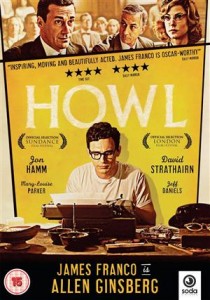 It’s always fascinating to see the result of an established practitioner of a separate artistic medium crossing over into the world of animation. Sometimes it’s misguided, as when certain high-profile directors see themselves seduced by the gloss of hyper-real CGI, though other instances can be pleasantly inspired. The latter can most definitely be applied to New York-based graphic novelist and illustrator Eric Drooker, whose first steps into the animation territory is a visualisation of Allen Ginsberg’s iconic poem ‘Howl’. Drooker’s long-standing association with Ginsberg, stemming from an unknowing mutual respect for one another’s work that eventually led to regular collaboration, makes him the perfect choice. Acting as Animation Designer, with TV animation veteran Jon Hays bringing the visuals to life, the end result serves as a fascinating and fundamental component of the Rob Epstein/Jeffrey Friedman-directed biopic ‘Howl’ (2010), a film that explores the genesis of the titular poem and the controversies it generated. The film stars James Franco (subsequently known for his role in Danny Boyle’s ‘127 Hours’) as Ginsberg, recounting his early years and how his life experiences shaped the poem that set his reputation in stone and career in motion. The action is divided between recreated interviews with Ginsberg, flashback sequences, the infamous 1957 obscenity trial the poem sparked and various recitations of the text itself, including those set to Drooker’s animation.
It’s always fascinating to see the result of an established practitioner of a separate artistic medium crossing over into the world of animation. Sometimes it’s misguided, as when certain high-profile directors see themselves seduced by the gloss of hyper-real CGI, though other instances can be pleasantly inspired. The latter can most definitely be applied to New York-based graphic novelist and illustrator Eric Drooker, whose first steps into the animation territory is a visualisation of Allen Ginsberg’s iconic poem ‘Howl’. Drooker’s long-standing association with Ginsberg, stemming from an unknowing mutual respect for one another’s work that eventually led to regular collaboration, makes him the perfect choice. Acting as Animation Designer, with TV animation veteran Jon Hays bringing the visuals to life, the end result serves as a fascinating and fundamental component of the Rob Epstein/Jeffrey Friedman-directed biopic ‘Howl’ (2010), a film that explores the genesis of the titular poem and the controversies it generated. The film stars James Franco (subsequently known for his role in Danny Boyle’s ‘127 Hours’) as Ginsberg, recounting his early years and how his life experiences shaped the poem that set his reputation in stone and career in motion. The action is divided between recreated interviews with Ginsberg, flashback sequences, the infamous 1957 obscenity trial the poem sparked and various recitations of the text itself, including those set to Drooker’s animation.
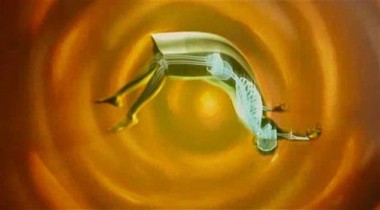
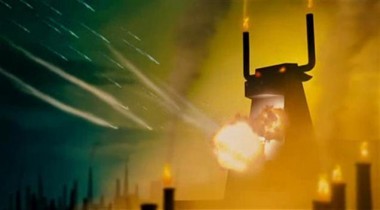
These sequences are certainly the crux of the film, giving it a visual edge that breaks up the live-action portions – arguably the story would not work at all without them. There is a level of visual sophistication rarely seen in independent film, and while they bow to the necessities of CGI processes, the gloss is rarely laid on thick. Certain visual effects sequences aside, the charm of the animation stems from the mixed media approach and the stylised, painted/illustrative quality that sidesteps the draw of the aforementioned hyperrealism that mainstream studios have such a craving for. It is, in a lot of respects, a tremendous visual departure from the graphic novel work Drooker is so known for – gone (for the most part) are the raw, monochrome, razor-on-scratchboard visuals, where mood is so expertly conveyed via use of shadow. Instead we’re presented with a more typically textured and shaded world, one merely glimpsed in his prior Ginsberg collaboration ‘Illuminated Poems’, though the stamp of Drooker remains present throughout. Certain familiar visual motifs pleasingly rear their heads – the angular designs, the painstakingly reproduced cityscapes, the skeletal illuminations of characters and the creative act itself represented as a billowing, supernatural expulsion. It’s a style that lends itself better to grandeur; One of the more masterfully executed sequences sees the industrial world characterised as the biblical figure Moloch, a correlation similarly drawn in ‘Metropolis’ (Dir. Fritz Lang, 1927).
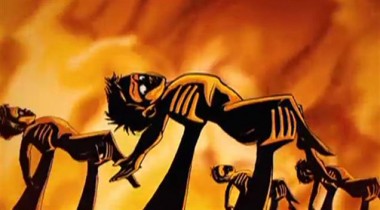
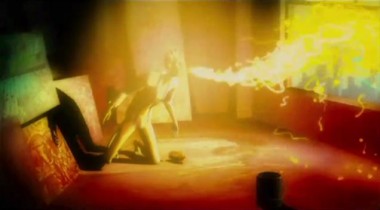
Drooker’s envisioning further updates the subject matter, marrying Ginsberg’s hallucinatory interpretation from the mid-1950s with more contemporary imagery of the Middle East and its role in present day politics. Less engaging, however, are the sequences where subtlety is called for; Once we’ve been treated to the elaborate vistas and journeys the Ginsberg of Drooker’s vision embarks on, the more subdued character animation (such as quotidian typewriter sequences and bar-room encounters) seems out of place and a little stilted – in all fairness, however, these moments are brief and infrequent.
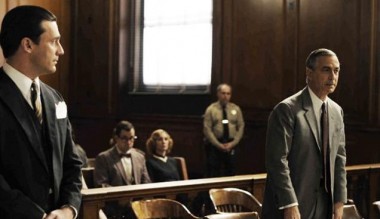
While my agenda in reviewing the film is automatically skewed coming at it from an animation – rather than a literary – enthusiast’s perspective, a fairly crucial issue is whether the film works as a whole. The structure lends itself more to non-linear documentary film-making than a conventional narrative – in fact, an actual documentary rather than a recreation of events may have served the film better. In the absence of available materials such as existing video footage, the dramatised portions based on court transcripts and interviews with Ginsberg are executed well enough. The supporting cast includes David Strathairn, one of independent cinema’s most recognisable faces known largely for his performance as journalist Edward R. Murrow in the similarly themed ‘Good Night and Good Luck’ (Dir. George Clooney, 2005). Portaying prosecutor Ralph McIntosh, he is a believable champion of the text’s banning, conveying less by way of self-righteousness than legitimate befuddlement as to its cultural value. Jon Hamm, of ‘Mad Men’ fame, is equally subdued as Jake Ehrlich, arguer for the book’s defence, systematic and methodical in his justification of the poem. It is this fidelity to the non-cinematic, un-dramatic nature of the actual events that perhaps stymies the film’s potential to engage its audience. As important a milestone the event was for literature and American civil liberties, these portions of the film come off as flat and stoic, though warmed somewhat by the fleeting appearances of Jeff Daniels and Mary-Louise Parker as two of the text’s more sanctimonious detractors.
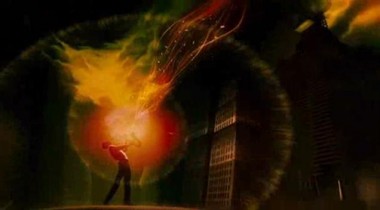
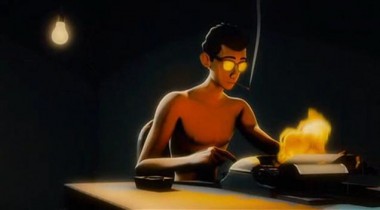
The real warmth comes from Ginsberg’s story, and whether or not the poem has any merit or resonance with a contemporary audience, its impact on the Beat Generation is represented authentically and passionately. The correlations between his life, anxieties, self-doubt and self-confidence with the development of the poem are played out via personal flashbacks and embellished through Drooker’s visuals. Franco’s portrayal of a Ginsberg in the early days of his notoriety is endearing as an interview subject, though in another instance of the film’s authenticity working against it, his impeccable imitation of Ginsberg’s delivery when reciting the poem itself tends to grate. Another crucial component that ties the film together is the score by Carter Burwell, a minimally arranged, oftentimes haunting backdrop with jazz leanings that, on occasion, steps up to the precipice of dominating the viewer’s attention but never quite oversteps its mark.
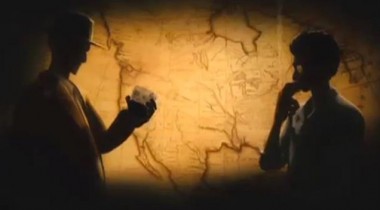
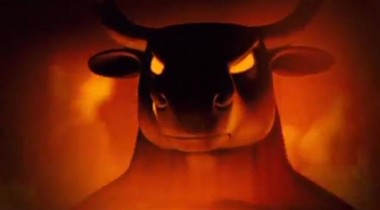
Ultimately, ‘Howl’ is a movie that brings to mind a battle ongoing in many facets of the entertainment industry, one fuelled by the question of whether the general public’s limited capacity to glean value or understanding in what’s caustic on a superficial level automatically makes it obscene. Juxtaposed against our current climate where high profile artists and entertainers still see their range of expression limited, cowed by the threat of litigation from any institution they dare challenge, the film serves as a comforting reminder of an early victory of artistic endeavour. It is a far from encyclopaedic account of the Beat Generation and its effect on the landscape of 20th century literature and Western culture, but at no point does it purport to be.
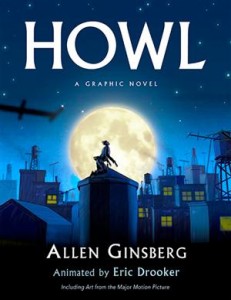 The graphic novel adaptation is essentially a thoughtfully laid out selection of stills from the animated segments of the film. Whether it tells its own story on top of lavishly illustrating the poem itself, which makes up the text, is down to the reader; Drooker’s long-standing association with Ginsberg certainly gives his visual interpretation a great deal of legitimacy. The end result serves as a combined tie-in for fans of the film, a decorative reprint for appreciators of the poem and a new Drooker novel in its own right, although in the context of his other work and the minimal style he’s known for, its heavily textured and composited aesthetic stands out a little. Which is not to say it is bad – in the film and on the page, it’s clear that animation director Jon Hays has made pains to reproduce the tone and fluidity of Drooker’s talents as a sequential artist and retain the accessible symbolism that makes his ideas so appealing.
The graphic novel adaptation is essentially a thoughtfully laid out selection of stills from the animated segments of the film. Whether it tells its own story on top of lavishly illustrating the poem itself, which makes up the text, is down to the reader; Drooker’s long-standing association with Ginsberg certainly gives his visual interpretation a great deal of legitimacy. The end result serves as a combined tie-in for fans of the film, a decorative reprint for appreciators of the poem and a new Drooker novel in its own right, although in the context of his other work and the minimal style he’s known for, its heavily textured and composited aesthetic stands out a little. Which is not to say it is bad – in the film and on the page, it’s clear that animation director Jon Hays has made pains to reproduce the tone and fluidity of Drooker’s talents as a sequential artist and retain the accessible symbolism that makes his ideas so appealing.
‘Howl’ (Dir. Rob Epstein/Jeffrey Friedman) is available to buy on DVD and Blu-Ray from Soda Pictures in the UK and Oscilloscope Laboratories in the US. Further info is available at the associated websites http://howlthemovie.com/ and http://www.sodapictures.com/howl/
‘Howl: A Graphic Novel’ by Allen Ginsberg and Eric Drooker is available through Penguin Classics ( www.penguinclassics.co.uk)

